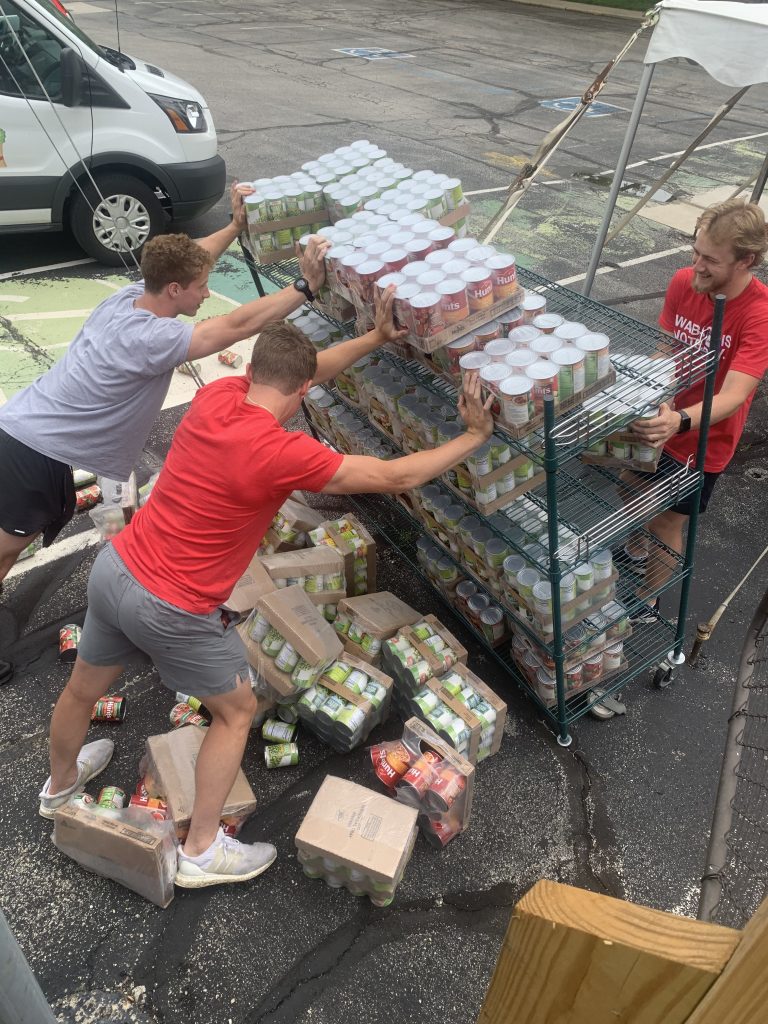
Camden Cooper ’24 — Being able to help at the Crooked Creek Food Pantry/Eskenazi Health Clinic has been an eye-opening experience to the community around me. We have had the privilege to work alongside a Wabash graduate, class of 67’, who has been running this pantry since its opening. One thing that has been brought to my attention is how many people in our communities don’t receive proper nutrition or have trouble affording it. In the clinic, we get to see patients who have troubles with their health due to their diet and nutrition. We can then refer them to the pantry where they can get food with proper nutrition and hopefully help their overall health long term. We have learned that families that don’t have access to proper nutrition are at a higher risk for fatty liver disease (in children) and diabetes.
For this reason, having the pantry connected to the clinic is such a valuable asset for the patients and people in the surrounding community. I have also learned all of the behind-the-scenes actions in order for a pantry such as ours to run efficiently. We are partnered with many different stores, organizations, and groups which help provide food, workers, and give donations to the pantry. With these partners, we can stay stocked with healthy foods for clients and have the proper equipment/help to dispense these goods to our clients.
One eye-opening experience that I have had over this past summer is the number of families who live in these surrounding areas in Indiana who don’t speak any English. A large majority of our clients are Hispanic/Latino and only speak Spanish. Therefore, being able to speak some Spanish is very helpful when trying to help these people. Seeing how much of the population in this community speaks another language showed me just how important it is for us to be more well-rounded in our studies and understanding of different cultures/languages. One thing I found very powerful was that the doctor who I shadowed was bilingual and was able to go from English in one room with one patient to Spanish in the next room with another patient. Experiencing this made me want to continue my studies in Spanish at Wabash.
There were many opportunities for learning and growing through this internship with all the interactions and opportunities on a day-to-day basis. We were able to interact with dozens of volunteers daily who come in and help at the pantry. We worked with them and even managed them all to help the pantry move in the right direction. Every day there was a new task that needed to be dealt with, and this allowed us to grow in our critical thinking skills because we have never experienced food pantry operations and needed to make decisions. Along with helping at the pantry, we shadowed Dr. Nace, one of the Eskenazi doctors, where we got to follow her throughout the day and see what she does in the clinic. I learned many new things from patient to patient, depending on what they were in the clinic. I saw many things that I expected and many new things that I can now put in my medical repertoire. Overall, there was always something new to learn at the pantry or in the clinic every day.
Some great takeaways from this experience are things that I’ve learned and encounters I’ve had with new people. Interacting with the managers at the pantry and learning from the president, I refined my conversational and communication skills. Working hands-on and talking with the people we serve at the pantry gave me the deepest feeling of satisfaction when I saw the smile on their faces or heard them say thank you with great sincerity. The feeling of having the opportunity to help others always fills my heart and makes me thankful I could be a part of such a fantastic experience. I would highly recommend this internship to anyone, even people not on the pre-med track, because of the valuable skills you learn and the memories you’ll make.